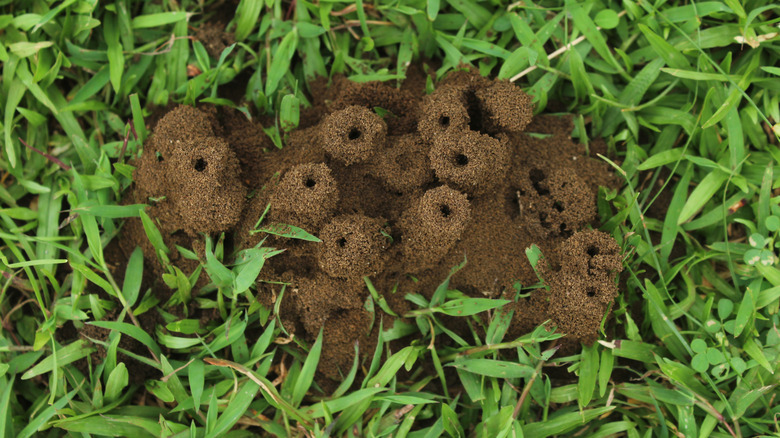Could A Simple Orange Oil And Molasses Hack Help Control Garden Ants?
Ants can be found in gardens for many reasons. Primarily, it's the availability of food such as decomposing plant materials, seeds, and even the honeydew from insects. In addition, the moisture and available spaces in between the plants and soil make for an ideal habitat. Although ants are not typical pests and serve an important role in the garden ecosystem, they can become an issue when they form symbiotic relationships with harmful pests like aphids, and when they damage cultivated plants. Luckily, there are several natural ways to get rid of ants, and one such nifty hack is to use a solution made from orange oil and molasses.
This simple hack needs the following ingredients to create at least a quart of organic ant deterrent: Orange oil, molasses, and liquid castile soap. For the materials, you'll need one empty quart bottle and a kettle filled with hot water. To prepare the solution, pour at least 5 ounces of molasses into the plastic bottle, and dilute it by adding 7 ounces of hot water from the kettle. Finally, pour 10 ounces of both the orange oil and the castile soap into the diluted molasses. Lastly, place a cap on the bottle to seal and protect the contents until use.
An efficient way to address ant infestations is to apply your solution directly where ants gather and in the general vicinity of their nests. To use the solution, simply pour a generous amount on the area where the ants are located, dispersing it evenly and soaking the soil thoroughly. For best results, allow the solution to sit for at least a day and repeat if needed.
Use this hack for natural and eco-friendly ant control
The reason this hack works is due to the properties of the ingredients. Ants and other insects are repelled by orange oil, which interferes with their scent trails, making them steer clear. Molasses, on the other hand, can be used as bait and serves as a soil additive that triggers a microbial bloom, which aggravates certain types of ants, causing them to move away. Lastly, castile soap is a naturally derived household soap that can banish ants from your home by disturbing scent trails and destroying the ants' cuticles, or protective coatings, leading to their death.
While there are misconceptions about organic pest control methods, the lessened effects on the environment and human health tend to make them a better alternative to synthetic chemicals. While both are useful for controlling pests, organic alternatives can decompose faster, which reduces water and soil contamination. Additionally, because of their natural ingredients, organic insecticides are non-toxic, causing less harm to people, pets, and beneficial insects.
In general, while their presence can be an annoyance in gardens, ants are not always harmful, and having them in the garden provides several advantages. Ants play an important role, serving as scavengers, soil engineers, and decomposers that help in nutrient cycling, soil aeration, and even pest control by feeding on other insects and their eggs. If an ant infestation is an issue, exploring eco-friendly ways to keep bugs out of the garden, like this orange oil and molasses hack, is an ideal alternative that helps protect the environment and sustain biodiversity in home gardens.
